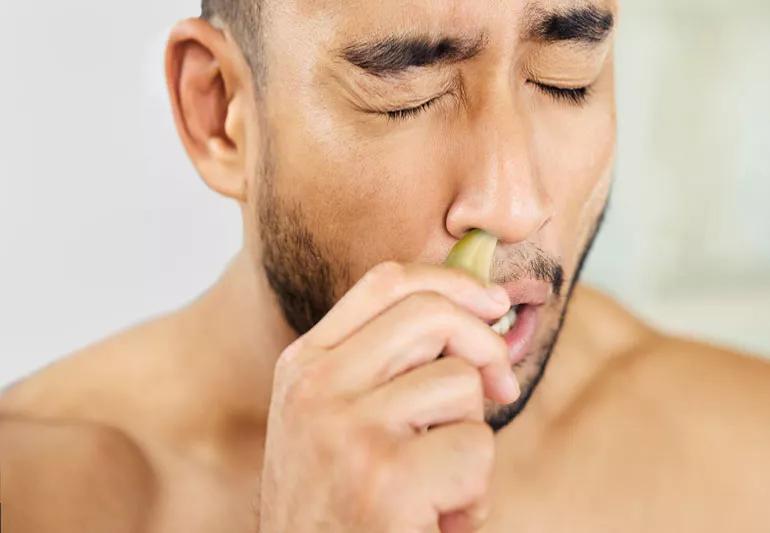Here’s one TikTok trend you shouldn’t try

Image content: This image is available to view online.
View image online (https://assets.clevelandclinic.org/transform/d4232937-9a00-46f6-b4e5-beaa3a6d38e8/manGarlicNose-1323641339-770x533-1_jpg)
man putting garlic in nose
Feel a case of the sniffles coming on? Some TikTokkers say putting a clove of raw garlic up your nose can clear your congestion. Viral videos show mucus flowing after removing the cloves — but it’s not what you think. As it turns out, garlic won’t help with your congestion and may even make it worse.
Advertisement
Cleveland Clinic is a non-profit academic medical center. Advertising on our site helps support our mission. We do not endorse non-Cleveland Clinic products or services. Policy
Otolaryngologist Raj Sindwani, MD, talks about whether this TikTok trick is indeed a hot tip or yet another trend to avoid.
Some TikTok users have shared videos of themselves with a clove of garlic in their nostril, a trick they say can relieve the nasal congestion associated with sinuses, colds and allergies. When the clove is removed, snot comes pouring out — seemingly evidence that the trick works.
But Dr. Sindwani says blocking your nostril with a pungent piece of garlic can actually cause more mucus to build, which is what rushes out upon removal of the clove.
“What you’re doing is putting this irritant up your nose — one with a very strong and noxious smell,” he says. “That irritates the lining of the nose, causing it to produce increased mucus while also trapping the mucus you already had.”
In other words, you’re kind of making the problem worse, not better.
Garlic has many health benefits — but sticking a raw clove up your nose to get rid of a cold is not among them.
“There are some complications that could arise from it,” Dr. Sindwani, “and in the end, it’s also just not going to help you.” And why stick garlic up your nose if it’s not going to work?
But in case the thought of extra mucus isn’t enough to turn you off to this trend, here are the other potential risks.
Advertisement
Anyone who’s ever had (or been) a curious child knows the risks of sticking something up the nose: It could get lodged in there. And even if the whole clove doesn’t get stuck, you could have trouble getting the whole thing out. “A part of it could break away, leaving some part of it in your nose,” Dr. Sindwani says.
Raw garlic can irritate and inflame your skin, which can even result in dermatitis. “The oils in the garlic could lead to a rash inside the nose, broken skin and even bleeding from the nose,” Dr. Sindwani warns.
Getting even a tiny piece of garlic stuck in your nostril can mean bad news for your body. “It can have a lot of consequences, including blockage of the sinuses and even infection,” Dr. Sindwani says.
There’s always a risk of trauma when you stick a foreign object up your nose. “You could hit part of the septum, which has a lot of blood vessels,” Dr. Sindwani says.
Skip the garlic and stick to some of the old-fashioned, medically proven methods of getting rid of a cold. “Colds are usually self-limited viral infections,” Dr. Sindwani explains. “It’s best to treat them holistically with rest, hydration and nasal sprays or irrigations with saline.”
If your cold persists, see your doctor, who may prescribe a nasal steroid spray or other medication — and definitely not a clove of garlic.
Advertisement

Sign up for our Health Essentials emails for expert guidance on nutrition, fitness, sleep, skin care and more.
Learn more about our editorial process.
Advertisement
Correct positioning is one of the keys to getting the best results
If your nose is constantly running, it could be allergies, chronic sinusitis, nasal polyps or other concerns
Allergies, indigestion and the effects of gravity can all mess with your nose at night
Staying calm, sitting up straight and gently pinching the sides of your nostrils can help a bloody nose go away faster
Dry air, allergies or nose-picking may be to blame for nighttime epistaxis
Take care of your runny or stuffy nose by staying hydrated, using a humidifier and considering a medication
Allergies, acid reflux and even pregnancy can increase drainage and upset your stomach
Seek help if bleeding doesn’t stop or they’re interfering with your life
Prioritize your health by managing stress, strengthening your social connections and getting quality sleep
Bolsters, blankets, pillows and blocks can offer extra support, stability and comfort
Allergies, postnasal drip, asthma or reflux could be to blame for a cough that won’t quit